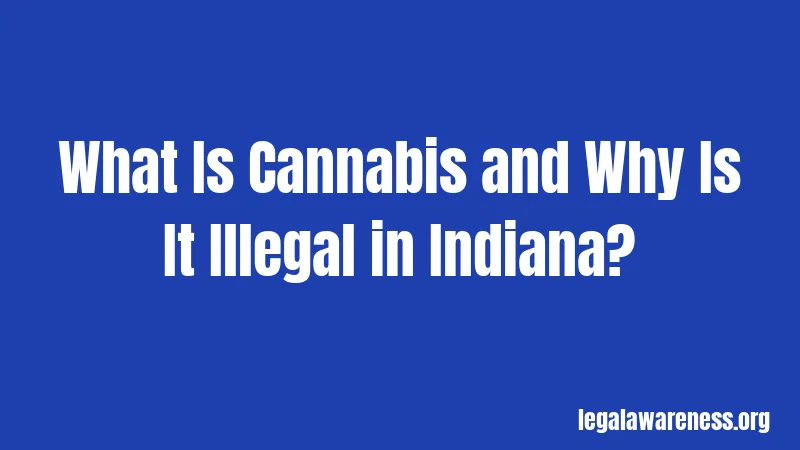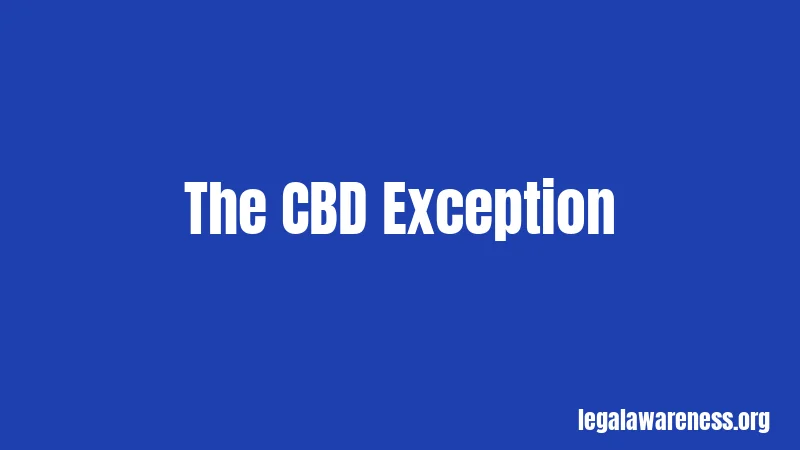Cannabis Laws in Indiana (2026): Still Totally Illegal
Most people assume weed is legal everywhere by now. Wrong. Indiana is one of the few states where cannabis is still completely illegal. And the penalties? They’re no joke.
Here’s the deal. While Michigan, Illinois, and Ohio let adults buy cannabis legally, Indiana says absolutely not. Even medical marijuana isn’t allowed. Let’s break down what you need to know if you live in the Hoosier State.
What Is Cannabis and Why Is It Illegal in Indiana?

Cannabis is a plant that contains chemicals called cannabinoids. The main ones are THC and CBD. THC gets you high. CBD doesn’t.
Indiana treats marijuana as a Schedule I controlled substance. That means the state considers it dangerous with no medical value. Pretty much everything related to cannabis is banned. Possession, growing, selling, using – all illegal.
The state has been like this for over 100 years. Indiana banned marijuana way back in 1913. Since then, lawmakers have repeatedly refused to change the rules. Even when neighboring states legalized it.
Basic Cannabis Laws in Indiana
Possession Is a Crime
Okay, this one’s important. If you get caught with any amount of weed in Indiana, you’re breaking the law. Even a tiny amount.
For your first offense, possession is a Class B misdemeanor. You could face up to 180 days in jail. Plus a fine up to $1,000.
Sound rough? It gets worse with repeat offenses.
Repeat Offenses Hit Harder
Got caught before? The penalties increase fast.
If you have a prior drug conviction and get caught again, it becomes a Class A misdemeanor. That’s up to one year in jail. And fines up to $5,000.
But wait, it gets worse. If you have a prior conviction and get caught with 30 grams or more, you’re facing a Level 6 felony. That means six months to 2.5 years in prison. Plus fines up to $10,000.
Yep, that’s prison time for weed in 2026.
Growing Cannabis Is Also Illegal
Don’t even think about growing your own. Cultivating marijuana carries the same penalties as possession. If you know weed is growing on your property and don’t destroy it, you can still be charged.
Some people assume growing for personal use is different than selling. Not in Indiana. The law treats them both seriously.
Selling or Dealing Cannabis

Dealing marijuana is way more serious than possession. The penalties depend on the amount and whether you’ve been convicted before.
Selling less than 30 grams is a Class A misdemeanor. Maximum one year in jail and $5,000 fine.
Selling 30 grams or more? That’s a Level 6 felony. Six months to 2.5 years in prison and up to $10,000 in fines.
If you have a prior dealing conviction, the penalties jump to a Level 5 felony. That’s one to six years in prison. And the fines stay the same at $10,000.
Honestly, this is where Indiana law gets really harsh.
Sales Near Schools Are Worse
Selling near schools, parks, or youth centers makes everything worse. The state adds enhanced penalties for dealing in these areas. They take protecting kids seriously.
Drug Paraphernalia Laws
Paraphernalia means pipes, bongs, rolling papers, grinders – basically anything used to consume cannabis.
Possession of paraphernalia is a Class C misdemeanor. Up to 60 days in jail and a $500 fine.
If you’ve been convicted before, it becomes a Class A misdemeanor. That’s up to one year in jail and a $5,000 fine.
Pretty straightforward. If it’s used for weed, you can get in trouble for having it.
The CBD Exception

Hold on, this part is important. CBD products are actually legal in Indiana. But there’s a catch.
The CBD must contain less than 0.3% THC. That’s the federal limit. Products meeting this standard are considered hemp, not marijuana.
You can buy CBD oil, gummies, and lotions legally. Many stores sell them openly. Just make sure they’re properly labeled and meet the THC limit.
Governor Eric Holcomb signed this into law in 2018. It was a small step forward. But it’s not the same as medical marijuana.
What About Medical Marijuana?
Not sure what counts as medical cannabis? Let me break it down. Indiana doesn’t have a medical marijuana program. At all.
Multiple bills tried to change this in 2025. House Bill 1178 would have created a medical program. Senate Bill 341 did the same. Both failed.
Lawmakers couldn’t even agree on letting patients with serious conditions use cannabis. Epilepsy, cancer, chronic pain – doesn’t matter. It’s still illegal.
If you have a medical marijuana card from another state, it means nothing in Indiana. You can still be arrested and charged. Your out-of-state card offers zero protection.
Many people assume this is legal. They find out the hard way. Don’t be one of them.
Recent Law Changes in 2025
Here’s where it gets interesting. Indiana actually made things stricter in 2025. Governor Mike Braun signed a law banning marijuana advertising.
The new law took effect in May 2025. Any business advertising cannabis in Indiana faces fines. First offense costs $5,000. Repeat violations jump to $15,000.
This targets dispensaries in Michigan, Illinois, and Ohio. They were running billboards and online ads aimed at Indiana residents. Not anymore.
Existing billboard contracts are grandfathered until 2035. But new ads are banned immediately. Social media, web ads, geo-targeted promotions – all prohibited.
Personally, I think this shows how resistant Indiana lawmakers are to change.
Failed Reform Bills in 2025
Several bills tried to legalize or decriminalize cannabis in 2025. None passed. Here’s what failed:
House Bill 1630 would have legalized recreational cannabis. Adults 21 and older could legally possess and buy it. The bill died in committee.
House Bill 1145 tried decriminalizing possession of two ounces or less. Also failed.
House Bill 1178 proposed a medical marijuana program. Dead on arrival.
Senate Bill 341 would have established medical cannabis, but only if the federal government rescheduled marijuana. Still failed.
In April 2025, lawmakers ruled out legalization as a solution for the state’s $2 billion budget shortfall. They said no thanks to the potential tax revenue.
Cross-Border Cannabis Tourism
Three of Indiana’s four neighbors have legal weed. Michigan, Illinois, and Ohio all allow recreational cannabis for adults 21 and older.
Many Indiana residents drive across state lines to buy legally. That’s fine while you’re in those states. But bringing it back to Indiana? Illegal.
You could get caught at the border. Or during a traffic stop in Indiana. Either way, you’re facing criminal charges.
Federal law also makes this risky. Crossing state lines with cannabis is drug trafficking under federal law. You could be charged even if both states allow it.
Trust me, this works better as a day trip where you consume everything before coming home.
What Happens If You Get Caught?
Let’s talk about the penalties. Because this confuses a lot of people.
For simple possession as a first offense, you’re looking at a Class B misdemeanor. Courts can impose up to 180 days in jail. Plus fines up to $1,000.
Many people get probation instead of jail time for first offenses. But it’s still a criminal conviction on your record.
That conviction can affect your life. Job applications often ask about criminal history. Housing applications too. Federal financial aid for college can be denied.
You might also lose your driver’s license. Indiana can suspend licenses for drug convictions. Even if you weren’t driving at the time.
How Law Enforcement Works
Police in Indiana actively enforce marijuana laws. They can search based on reasonable suspicion. If an officer smells marijuana during a traffic stop, that’s often enough for a search.
Some people think police don’t care about small amounts anymore. Wrong. Indiana officers still arrest for possession. The state hasn’t adopted the relaxed approach you see elsewhere.
Delta-8 THC and Hemp Products
Wondering if Delta-8 is legal? Sound complicated? It’s actually not.
Delta-8 THC is a compound derived from hemp. It’s psychoactive, meaning it can get you high. But it’s weaker than regular Delta-9 THC.
Some stores in Indiana sell Delta-8 products. But the legality is murky. Law enforcement has questioned whether these products violate state law.
Senate Bill 478 proposed stricter regulations on Delta-8 in 2025. The bill hasn’t passed yet. So Delta-8 exists in a gray area.
My advice? Be careful with Delta-8. Just because it’s sold in stores doesn’t mean it’s clearly legal.
Potential Future Changes
Could Indiana legalize cannabis eventually? Maybe. But don’t hold your breath.
Governor Braun has said it might be time for medical marijuana. He expressed cautious openness to therapeutic cannabis. But he also wants protections against psychoactive THC products.
Republican leaders in the legislature oppose reform. Senate President Pro Tem Rodric Bray said he doesn’t see compelling medical cases for legalization. House Speaker Todd Huston doubted marijuana’s medical benefits.
Some legislators suggested supporters just want tax revenue. They dismissed medical arguments as cover for recreational use.
Public opinion tells a different story. Polls show nearly 9 in 10 Indiana adults support medical marijuana. But that hasn’t swayed lawmakers yet.
Indiana might wait until federal law changes. Some politicians say they won’t act until marijuana is federally legal.
Comparing Indiana to Neighboring States
Indiana is increasingly an outlier. It’s one of only 12 states with no effective medical cannabis law. And one of only 19 that still impose jail time for simple possession.
Let’s compare to nearby states:
Michigan legalized recreational cannabis in 2018. Adults 21 and older can possess up to 2.5 ounces. They can grow 12 plants at home.
Illinois legalized in 2020. Similar rules. Adults can buy from dispensaries statewide.
Ohio voted to legalize in 2023. The program launched in 2024. Now it’s fully operational.
Kentucky has medical marijuana. Patients with qualifying conditions can legally use cannabis.
Only Indiana stands firm against any reform. The contrast is pretty stark.
What You Should Do
Now, here’s where things get serious. If you live in Indiana, you need to understand the risks.
Don’t assume weed is legal just because it’s legal nearby. Indiana law is clear. Cannabis is illegal in all forms.
If you’re caught, get a lawyer immediately. Don’t talk to police without one. Anything you say can and will be used against you.
Consider the long-term consequences before taking risks. A criminal conviction follows you. It affects jobs, housing, education, and more.
If you support legalization, contact your state legislators. Tell them this issue matters to you. Public pressure is the only way laws change.
Stay informed about law changes. Indiana might eventually reform. But until then, the law is the law.
Your Rights During a Stop
Let’s talk about what happens if police stop you. Know your rights.
Police need reasonable suspicion to stop your car. They need probable cause to search it. But in practice, the smell of marijuana gives them probable cause in Indiana.
You don’t have to consent to a search. You can politely refuse. But if they have probable cause, they’ll search anyway.
You have the right to remain silent. Use it. Don’t explain where you’ve been or what you were doing. Politely decline to answer questions.
You have the right to an attorney. Request one immediately if you’re arrested. Don’t give a statement without legal representation.
These rights matter. Exercise them.
Frequently Asked Questions
Is CBD legal in Indiana?
Yes, CBD products containing less than 0.3% THC are legal. They must be properly labeled and derived from hemp. Many stores sell CBD oil, gummies, and topicals.
Can I use medical marijuana in Indiana with an out-of-state card?
No. Indiana doesn’t recognize medical marijuana cards from other states. You can still be arrested and charged even with a valid card from elsewhere.
What happens if I get caught with a small amount of weed?
First offense is a Class B misdemeanor. You face up to 180 days in jail and fines up to $1,000. Many first-time offenders get probation instead of jail time.
Can I legally buy cannabis in Michigan and bring it back to Indiana?
No. Bringing cannabis into Indiana is illegal. You could be charged with possession in Indiana or drug trafficking under federal law for crossing state lines.
Will Indiana legalize marijuana soon?
Probably not. Multiple reform bills failed in 2025. Republican legislative leaders strongly oppose legalization. Public support is high, but lawmakers haven’t budged.
Final Thoughts
Indiana’s cannabis laws are strict. Really strict. While most of the country moves toward legalization, Indiana holds the line.
Possession means jail time and fines. Selling means prison and hefty fines. Even advertising weed is now illegal.
The state allows CBD products with minimal THC. That’s the only exception. Everything else is prohibited.
Know the laws. Understand the risks. Make informed decisions. And if you want change, let your legislators know.
Stay safe out there.
References
- Indiana Code § 35-48-4-11 – Possession of Marijuana, Hash Oil, Hashish, or Salvia
https://law.justia.com/codes/indiana/title-35/article-48/chapter-4/section-35-48-4-11/ - Indiana Treatment Centers – Indiana Marijuana Laws 2025
https://indianatreatmentcenters.com/indiana-marijuana-laws-2025/ - NORML – Indiana Laws and Penalties
https://norml.org/laws/indiana-penalties-2/ - Marijuana Policy Project – Indiana
https://www.mpp.org/states/indiana/ - Indiana General Assembly – House Bill 1390 (Marijuana Advertising Ban, 2025)
https://iga.in.gov/legislative/2025/bills/house/1390 - Dogan & Dogan Law – Indiana Marijuana Law Update for 2025
https://www.doganlaw.com/indiana-marijuana-law-update-for-2025
